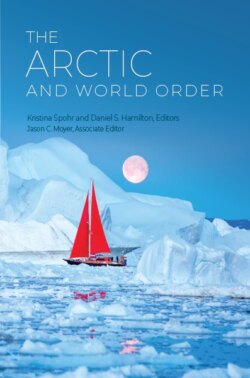Читать книгу The Arctic and World Order - Группа авторов - Страница 22
На сайте Литреса книга снята с продажи.
Introduction
ОглавлениеThe Arctic has many international institutions and organizations. The Arctic Council is a state-run forum promoting inter-governmental cooperation among members. It also includes Arctic Indigenous peoples (represented through their specific organizations) as permanent particpants as well as non-Arctic observer states and others.1 The Northern Forum is a consortium of sub-national governments sharing ideas and activities related to the Arctic.2 The Arctic Circle is a non-governmental forum for businesses and others to discuss Arctic affairs and make connections throughout the region and beyond.3 The International Arctic Science Committee brings research organizations and scientists together.4 Various treaties and arrangements foster bi- and multi-lateral cooperation on Indigenous rights, commercial shipping, polar bear conservation, fisheries management, marine mammal hunting, oil spill response, search and rescue, trans-border travel, scientific research, and many other aspects related to the interactions of humans with one another and with the environment.5
Significantly, international cooperation has long been a hallmark of the Arctic. A British expedition brought Norway’s Fridtjof Nansen and Hjalmar Johansen back from Russia’s Franz Josef Land after their epic journey across the sea ice towards the North Pole and back.6 A Russian icebreaker came to Barrow, Alaska, in October 1988 to help clear an escape path for gray whales stranded in a shrinking opening in the ice. The dispute over Hans Island between Canada’s Ellesmere Island and Greenland features each country staking its claim by leaving a bottle of liquor for the other to find. Russia and the United States clash over Crimea, Syria, and other matters around the world, but nonetheless in 2018 presented a joint proposal that was adopted by the International Maritime Organization (IMO) to establish shipping lanes in the Bering Strait.7 The few remaining boundary disputes are relatively minor, unlikely to cause major conflict and, perhaps as a result, likely to persist at least until they actually matter.8
In this chapter, I examine the prospects of Arctic conservation in light of the state of Arctic cooperation and institutions today, the lack of a consistent and compelling vision for the Arctic, the choices that are before us, and possible pathways for the next two decades.
